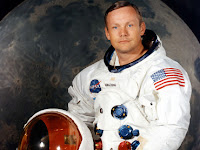The Eagle Has Landed
I was a space flight geek as a kid. I remember watching television coverage of the launches and recoveries of the earliest American space flights. At one time I knew the names of every astronaut, the year each flew and what their mission involved. I still know some of them … Alan Shepard was first, going up and down, John Glenn was the first to orbit (three times), Gus Grissom was another name I remember. I knew some of the flight trivia … Shepard’s flight was just a short few minutes up then back down so NASA didn’t design anything for, uhh, going to the bathroom, but there were hours of delays on the launch pad that morning. He peed in his suit, setting off all kinds of sensors. I’m not sure that trivia was mentioned in the TV coverage; it might have only been noted later during some retelling of that day.
Our country was in a state of turmoil during the eighteen months prior to Armstrong’s small step. Dr. Martin Luther King Jr. and Presidential candidate Robert Kennedy had both been gunned down in 1968, there were numerous racial demonstrations and Vietnam War protests that often led to violence. The USA needed something positive and the Apollo 11 mission served that need.
There were questions then and even more today about whether or not money should be spent on human space flight. It does seem frivolous in light of crumbling infrastructure, huge Federal debt and other financial priorities, yet many innovations were the result of manned space flight: GPS, cell phones, computer miniaturization, digital mammography instrumentation and kidney dialysis devices, osteoporosis studies, better sunglasses, fuel economy, smoke detectors, cordless drills, ski boots, computer game joysticks, improved weather forecasting, international cooperation and incentives for children to study science.
But one of the single most significant milestones of space exploration came from one small step taken by a nerdy engineer test pilot from an Ohio town sixty miles north of where the Wright Brothers had lived, who landed on the moon a mere 66 years after their first powered flight at Kitty Hawk. Another bit of trivia: Armstrong and Buzz Aldrin realized as they got close to the surface during the landing that they were over a boulder field. Armstrong took semi-automatic control and safely landed a few miles from their intended target with less than 25 seconds of landing fuel left. The Lunar Module used the call sign Eagle, named for the American Eagle, and the crew ended their landing checklist with the words, “Houston, Tranquility Base here. The Eagle has landed."
The landing (slip ahead to about 6 minutes in):
The first steps:

Comments